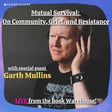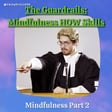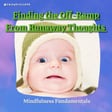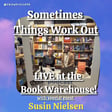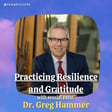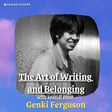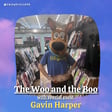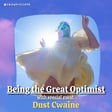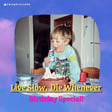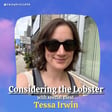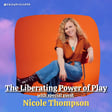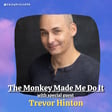Reflections on May
00:00:08
Speaker
Well, hey there, sweet peas. Welcome back Friendless. I'm your host, James Avramenko, back once again with a brand new solo episode. It is the end of May, and you know what that means.
00:00:19
Speaker
It's time for a brand new end of May wrap-up episode. We're going to reflect back on the ups and the downs of the month.
Solitude vs Loneliness Exploration
00:00:28
Speaker
We're going to do a deep dive into the duality of solitude versus loneliness.
00:00:32
Speaker
And of course, we've got a brand new batch of listener questions and all sorts of other goodies. So let's get into it. It's time to lean back, get comfy, set your volume at a reasonable level, and enjoy this end of the month wrap-up solo episode here on Friendless.
Memes and Annual Repetition
00:00:48
Speaker
So the month of May has come and gone, and along with it, all the played-out, it's-going-to-be-May memes. The life cycle of memes always kind of fascinates me. and The idea of, like, there's the sort of the origin point where it's, like, surprising and funny, and then it gets repeated, and it gets kind of...
00:01:03
Speaker
disseminated through the tiers of social medias and then it becomes kind of saturated um but but especially with these kind of like annual ones you know you could see the year on year who keeps doing it you know who's who's sharing the happy october third day for mean girls kind of thing and i'm certain this is a part of my kind of like ornery ah you know i became an old man when i was 12 type uh vibes but but I find myself feeling this kind of like dread tension around some of them, you know? So, so when April's winding down and I, I know some people are going to start sharing those ramen photos of, of Justin Timberlake and all that.
00:01:44
Speaker
Um, um, but but, but also much to my relief, uh, those, though those, uh, memes have, have predominantly shifted over into the sort of the Facebook level of, of, uh, sharing. And so I don't really see them anymore.
Daily Outreach Reflections
00:01:59
Speaker
at the At the start of the month, I had ah set a goal, um as I talked about it in my previous solo episode, that I was going to try and make a point to reach out to a friend or, you know, someone i care about at least once a day, every day for the whole month of May.
00:02:17
Speaker
And, you know, I was reflecting on it. And what's funny is that, like, I did technically accomplish that goal. And yet, for some reason, inside, I still feel unfulfilled.
00:02:30
Speaker
And now I'm sure this is something I could talk about with my therapist. I'm sure this is something he has heard me talk about many, many times and probably is sick of hearing about.
Unfulfilled Progress and Small Changes
00:02:38
Speaker
But but it's it's just it's yet another kind of pointed example of this idea of of sometimes we don't realize the progress we're making because progress doesn't really feel like progress if it's incremental.
00:02:50
Speaker
Right. If it's just sort of like slowly but surely coming along and day by day, you're just sort of adjusting slightly. um It doesn't really feel like a change. It's sort of like, you know, if you if you go back and you look at a photo of yourself one year ago or two years ago or five years ago, you know, you don't really notice the changes until you actually see the photo and you see, holy shit, that's where I was. That's what I looked like. That's what I was wearing or whatever it might be. Those are the people I was hanging out with. Jesus, you know, right.
Reciprocation and Incremental Practice
00:03:18
Speaker
um and And I can't help but feel like that's sort of what ah this month represented for me is that in in in reflection, my instinct is to tell myself that I didn't really accomplish much. And yet at the same time, too, I know that I placed a lot of foundational work and a lot of kind of iterative work that...
00:03:35
Speaker
um that this kind of friend outreach goal is an example of in that you know it's not big it's not flashy it's not something that i can kind of like display and brag about on social media but it is something that every day once a day i took a moment to practice and try out and and the reception was absolutely lovely um the funny thing that was that a lot of the time now i I don't know if you know these people were listening to the show and were taking on the initiative from that or if they were just feeling friendly, but ah a lot of the month was actually prompted by other people reaching out first. And that was just like, that tickled me absolutely pink.
00:04:15
Speaker
um You know, nothing makes me happier. ah Few things, I should say. let's Let's watch those black and whites. But, you know, very few things make me happier than an unprompted, hey, how the hell are you? Or a meme.
00:04:27
Speaker
Or a, hey, let's go see a movie. Or whatever it might be. um Especially coming from people who understand that ah the I'm very much the embodiment of, I'm probably going to say no, but I still want to be invited.
00:04:41
Speaker
um And the the people who have the patience to to try again. um Because I know how insufferable that is. I know how annoying that can be. um And I am working on it. um And I said yes to many things this month that but at other times I very likely would have just instinctly instinctively said no, curled up under my blankets, then wondered why nobody invites me out to things.
00:05:07
Speaker
But that kind of incremental practice is really what the focus of the whole month has been. and And I feel like I can pretty confidently chalk that up to a victory, um as much as my kind of goblin brain wants to to tell me all the things I did wrong.
00:05:21
Speaker
Which, of course, does lead me into this sort of, you know, pros and cons, ups and downs. There's there's there's goods, there's bads, there's in-betweens.
Life's Dualities and Incomplete Projects
00:05:28
Speaker
um You know, as 50 Cent so eloquently put it once,
00:05:32
Speaker
Sunny days wouldn't be special if it wasn't for rain. Joy wouldn't feel so good if it wasn't for pain. And, you know, I think that that really says a lot about life, don't you? But I yeah i find myself at a crossroads.
00:05:46
Speaker
um One of the things I really wanted to get out by the end of this month that I didn't is ah my my chapbook. And I'm kind of beating myself up about that. and And at the same time, too, I also really wanted to expand my sort of promotional content of the show in general.
00:05:59
Speaker
When I relaunched in April, I had this massive surge of listeners because I was sharing content that was you know engaging and interesting and exciting. And you know i don't want to just chalk it up to the guests, even though obviously the guests had played a huge part in it.
00:06:15
Speaker
But it was just sort of like the whole the whole blitz. And as the weeks have gone on, I just haven't been able to keep up to it. And I haven't been able to maintain the same schedule. And it's something that I'm working on refocusing for the for the for the coming months.
00:06:28
Speaker
um But we'll kind of see how it plays. And I am just trying to sort of be gentle with myself of like, you know, I'm doing this alone. I'm figuring out as I go. and Even so seven years in, I'm still learning stuff. I'm still figuring out how to do stuff. And so, you know, it's just it's a process. Right. And I think I'm just trying to vocalize that is OK to not be where you want to be.
00:06:52
Speaker
um That doesn't mean where you are isn't enough. It just means you have further you still want to go. And I think that says a lot about life, too. Look at us, me and 50 Cent just speaking truths, right?
Embracing Dialectics in DBT
00:07:06
Speaker
But that really does speak to you kind of what has been on my mind a lot lately is the idea of dualities or, you know, dialectics. um When I record this, I am about to have my very last session of my DBT.
00:07:20
Speaker
ah group this week and and you know throughou throughout this whole six month process um ah so much of my thinking so much of my contemplation so many ah so much of my exploration has been around this idea of releasing black and white releasing binary thinking and instead allowing two or multiple things to be true and and understanding that when something hurts, that doesn't mean good can't come out of it.
00:07:46
Speaker
And when something feels good, that doesn't mean harm can't come out of it. And and understanding that nothing exists within a vacuum. and that we need to... we It's beneficial to us to recognize the the interplay between these kind of dueling ah interpretations of of life.
00:08:07
Speaker
And instead of kind of spending my days actively trying to be comfortable and actively trying to stay ah in my little cocoon, instead sort of venturing out and and recognizing that growth really only happens in discomfort, you know?
00:08:23
Speaker
There's a reason it's a tired old metaphor of like, you know, plants only grow under pressure and all that kind of thing, because it's true. And I know we all hate it when a cliche ah bears some truth. But, you know, it really is the only way to truly grow is to ah get out of your your comfort zone and to get into something that's going to kind of challenge you.
00:08:45
Speaker
And that's very much what ah the guests of this month have have brought forth into kind of my thinking and the things that I've been exploring. exploring um You know, my recent interview with Magda Baker, um he he had this incredible metaphor about, he called it something along the lines of the the the grilled cheese theory, which is this idea that, you know, sometimes tasks can feel absolutely impossible until we just go out and do them.
00:09:12
Speaker
you know just make the grilled cheese even though you know i know you ate yesterday and you don't want to cook but but sometimes a task can feel impossible until you do it and you recognize it's just making a grilled cheese it's nothing right anybody can do that um and so so understanding that sometimes the narratives we create in our minds make things worse than they actually are and we put more pressure on ourselves than need to be there uh in an effort to you know it's a beautiful instinct that our brain has here right our our brain's instinct behind that is we got to protect ourselves we got to make sure we stay safe we got to make sure we stay alive um the the trouble comes in that um our little instinct brain uh hasn't really caught up to the the modern world and hasn't recognized when something feels unsafe versus when something is actually unsafe
00:10:04
Speaker
Obviously, there's so much nuance behind that. And and when when my brain goes into certain contexts, and and I'm sure yours does as well, ah recognizing that that is contextually speaking. I'm not saying like, yeah, if you feel bad about getting into an elevator with scary men, like, don't listen to your brain, right? No, no, no, no, no. That's not what I'm meaning at all. I'm saying, but it's like, I don't want to do my laundry properly.
00:10:28
Speaker
right you know Context here, okay? But the other piece behind this grilled cheese theory is this idea of um you know finding joy and finding hope in small
Finding Joy in Small Steps
00:10:41
Speaker
not getting yourself yeah Not beating yourself up because these monumental steps haven't been taken or these monumental accomplishments, but instead allowing yourself to just feel absolute joy in the little things.
00:10:54
Speaker
Which leads me into something that my interview with with Dr. Christine Cooper reminded me of, which is about intentionality and being really concrete about what those steps are gonna be.
00:11:06
Speaker
um We can't expect others to show up and know who we are, what we're about, what we want, if we, A, haven't communicated it to them, but before that, actually, haven't communicated it to ourselves. so And funny enough, this is actually something I was just talking about with my therapist in our last session is this idea of you don't actually have to communicate it to people.
00:11:26
Speaker
but That's actually not what it's about. um But communicating it to yourself is probably the most key because if you know what you're about and you know what you want, you can then start looking to the world to, you know, how to enact it.
00:11:40
Speaker
um This is a piece that this last section of DBT that I've been doing is about radical acceptance. And it's this idea that you can't change something if you don't first accept what it is.
00:11:53
Speaker
And you don't have to like the way reality is. You don't have to be okay with the way reality is. But you do have to accept that that is what reality is.
00:12:04
Speaker
um I don't like parts of my past. I don't like how I behaved. I don't like how others behaved. I don't like choices that were made. I don't like situations I was in.
00:12:15
Speaker
x y z that doesn't change the fact that they happened and there's nothing i can do now to alter those events that's done it's in the past it's gone um but what i can do is i can accept that those really happened and i now get a chance to behave differently going forward so you know in the in the sense that um you know as i'm a I'm often parroting from my therapist about um awareness is half the battle.
00:12:43
Speaker
You know, you can't change something until you're aware of it. And then you you have to accept that that is what it is. You can be mindful of what you would like it to be.
00:12:53
Speaker
You can be mindful of where you would like to go. But you can't say, um well, I don't like that. Because it shouldn't be like that. And it's like, yeah, you're absolutely right. It shouldn't be. But it is.
00:13:04
Speaker
So tough shit, right? And when you accept it, you then can move into what steps do I actually want to take in order to create the environment that I want? What boundaries do I need? What what understandings do I need? What concessions do I need? Whatever it might be.
Authenticity in Friendships
00:13:21
Speaker
um So that you can first communicate to yourself and then communicate it to the people you want around you. Which takes me right into my biggest takeaway from my my third interview with my dear friend Mel Zee, talking about how to behave with authenticity.
00:13:36
Speaker
Oftentimes we find ourselves kind of acting out out of it instinct and we think that's who we are. um And in a way, it it absolutely is That's sort of our baseline ah protective brain behavior.
00:13:47
Speaker
But when we regulate ourselves, when we collect our thoughts, and when we act with intention, um that allows us to show up with the most authenticity possible.
00:13:58
Speaker
And while that doesn't mean ah showcasing our entirety to you know for the world to consume, that doesn't necessarily mean like I'm going to share my you know every deepest, darkest secret to to TikTok.
00:14:11
Speaker
That also means um allowing the people around us to experience the full scope of our being, um not hiding parts of us because of shame or because of resistance or or whatever it might be.
00:14:26
Speaker
If you need to express a part of yourself to someone and you don't because you're afraid that they will no longer be around, that means they shouldn't be around already.
00:14:38
Speaker
And so when we act with an authenticity, um what that does is it pulls people in who are supposed to be there and it pushes people away who aren't. um So don't be afraid of the sort of full spectrum of who you are and don't dim that light because it might keep somebody around longer. it's it's It's going to be always more beneficial to let those people go.
00:15:03
Speaker
that it is to dim your authenticity in order to keep them around a little bit longer. Because they they're going to go one way or another. that's that's just That's what's going to happen. So you might as well rip the Band-Aid down. was listening back to to the interviews of the month, and you know these themes kept on popping up. The idea of... you know as ah as As I've been exploring throughout the last couple of seasons, you know, community versus the individual, ah the action ah of being a friend, ah curiosity, openness, boundaries, respect.
00:15:34
Speaker
um And it really started, again, reflecting back um this idea of duality and and the dialectics of these kinds of questions.
Solitude vs Isolation Emotional Impact
00:15:43
Speaker
um and one of the sort of um as as i touched on earlier one of one of the sort of concepts concepts that i've been sort of pushing through that lens has been the idea of solitude versus isolation and how you know it can go from being a safe haven to being a pressure cooker and how do we strike some sort of balance. um you know
00:16:10
Speaker
Recognizing again, you know another reminder from Scott, There is no such thing as balance. And balance actually doesn't really need to be your end goal. um It's never going to be a 50-50 thing. It's just going to be what is your scale, right? What is it you want out of this?
00:16:25
Speaker
um but But understanding that, you know, solitude can be beautiful and nourishing and replenishing and recharging. And then it can also be really draining and scary and dysregulating.
00:16:36
Speaker
right so i wanted to sort of dive into that thought a little bit more and then i wanted to offer a couple tools that i have been working with recently um around my own kind of processing of my solitude uh versus my isolation um and try and give you a ah few actionable things that you can try out uh if you are so inclined so when i say the word solitude What comes to mind for you?
Solitude as Sanctuary for Creativity
00:17:02
Speaker
For me, as with most words, um it it bears so many contradictory feelings. um i know i know, again, as with most words, especially the sort of big...
00:17:18
Speaker
was about to say, is implicative? That's not a word. like Implicit. You know, the sort of the the the implication. It's all about the implication. ha ha ha! The implication behind most words often ah triggers a bit of a gut negative reaction in me, and that's something I'm working on. But, you know, on one hand, there's these feelings of of sanctuary, right?
00:17:41
Speaker
ah You know, there's the emotional reprieve. um You're allowed to kind of take a pause and decompress, for whether it's from, you know, daily stresses or or whatever it might be. But you you get to recharge, reset, and and just sort of be without external demands.
00:17:56
Speaker
um You know, there's there's the benefits of quiet time. ah Things are so loud in this world. and and um And, you know, solitude really allows you to just sort of like, if if what you want is silence, then you get silence.
00:18:13
Speaker
um More often than not, art, yeah at least my art, isn't really created ah collectively. you know it's it's It's difficult to to to write a poem in a group.
00:18:24
Speaker
Obviously, it can't be done, but not often work groups. not often i work in in groups so So even things like body doubling or co-working, it's often, I find it very difficult to get into those sort of deep concentration zones um for creativity. And so so solitude is is so fundamental to my creative practice um to allow me to sort of ruminate and really chew on something and really unpack it.
00:18:49
Speaker
um And of course it allows for creativity Moments of mindfulness. um You know, if if if if a mindfulness practice isn't ah already established and already a very natural, instinctual element, um it doesn't come very easily around other people.
00:19:08
Speaker
um Something that they've been introducing in the last couple sessions in DBT has been getting us to do mindful practices around things that are like quite stimulating, quite chaotic, really. um And and ah it's difficult.
00:19:20
Speaker
um But it is also, it's really rewarding when you're like, oh, yeah, I can totally practice mindfulness and in the club or, you know, listen to a loud music or whatever it might be. but um But if you're establishing those practices, you know, you you really want to get started in a sort of ah solo, solitude type type environment.
00:19:38
Speaker
you know allowing there to be space for your inner monologue to come out and really, really talk to you. um um It's another thing DPT around the idea of wise mind.
00:19:49
Speaker
one of the One of the ways that we can practice wise mind is by literally stopping and asking ourselves, what is the wise mind choice here? And not just rushing to the answer, but really sitting with it and allowing that piece of us to come out and speak.
00:20:05
Speaker
I'm going to be doing a much more fulsome exploration of all the dbt steps. I've been waiting to get through the entire ah program before I sort of reflect on it and because I really want to talk about how it's impacted me, how I've been implementing the different tools and not just kind of like rush in because I'm like so giddy about it. um You know, I will say, you know,
00:20:25
Speaker
Sneak peek, it's changed my life. um and And I feel just so much more equipped for life's travails um around it. um Do you know travail?
00:20:39
Speaker
Here's a fun digression. Travail is derived from, obviously, a ah French word travail, which is another word for work. um But it actually derives from a medieval torture device.
00:20:53
Speaker
the true the I believe it was called the travail or the travailo or something like that. And it was essentially a big rod that they would shove up people's asses. um And so technically speaking, the etymology of the word work comes from shoving a big rod up your ass.
00:21:16
Speaker
I just find that charming, you know, because I really feel like that says a lot about life and a lot about work, doesn't it?
00:21:25
Speaker
Where was I? Where was I? Where was I? Isolation, solitude, right, right, right, right.
Solitude Leading to Isolation
00:21:30
Speaker
You know, obviously there's there's the benefits. There's also the negatives, right? You know, with solitude comes isolation, comes loneliness, comes these feelings of of if you don't want to be alone, but you find yourself there and you feel kind of trapped within the prison of your little cave.
00:21:46
Speaker
um And suddenly all those little creature comforts that you've built around you ah become these kind of impregnable walls and you don't really know how to get out. Now, obviously, through practice, you would start challenging those questions. You know, often when we say things like, I don't know how, it's more, it's actually saying, I don't want to do that.
00:22:03
Speaker
right As adults, we we often do know how to do most things. We just don't want to. right and um And I think it's really important to acknowledge that that that's fine.
Personal Solitude and Connection Needs
00:22:12
Speaker
You don't have to. but But I think ah this sort of learned helplessness that we all ah apply at one point or another ah more often than not is something that's worth kind of challenging. but but but But that instinctual feeling of I don't know how to get out of this.
00:22:25
Speaker
um it leads into this kind of overwhelming freeze and lockdown. you know It can lead to these these moments of self-critique. If you sit in silence long enough, ah the other voices are gonna creep in, right? And and you know you might have chosen, oh this is gonna be empowering and I'm gonna love this, and then the other voice starts whispering, you know it's because they don't wanna hang out with you, or it's because whatever the the stories you wanna tell yourself.
00:22:51
Speaker
um And so it can become a sort of a self-perpetuating aerobarose of of um negative self-talk and criticism. And that's where that's sort of, you know, the only word I can come up with right now is balance, but but don't envision it as like a 50-50. It's more about like, what are your scales? what How do you want to determine ah the the the weight of each scale of of connection versus solitude?
00:23:17
Speaker
And really, the first thing you you need to determine is exactly that. What are your personal needs? Do you need to see people a lot? Do you need to just have kind of set times?
00:23:30
Speaker
Does it need to be daily, weekly, monthly, whatever it might be? um um And recognizing all of these are fluid. they They're not locked in. It's not, I made this choice, so I have to always be doing it. It's, you know, what do you want to try out first? Do you want to try out seeing your friend once a week? Do you want to try out calling your friend once a day, whatever it might be?
00:23:49
Speaker
So first kind of determining what are your personal thresholds around the need for solitude and then the need for connection and sort of experimenting with You know, what is your threshold where um that that solitude ah sort of channels or or encourages whether it's creativity or mindfulness or whatever, but then tips itself past that that level and moves into, you know, it sort of eroding your emotional well-being?
00:24:18
Speaker
So maybe you experiment with this by by ah playing with a calendar. Maybe you lay out for one week. You try ah seeing someone once a day. And then you kind of gauge your your sort of yeah energy metrics, you know, like like how nourished did you feel? How good did you feel? how How ah many spoons did you use up planning that?
00:24:39
Speaker
ah How many spoons did you use ah going to do that activity, whatever it might be? And and and how do you recharge those?
Experimenting with Activities
00:24:47
Speaker
ive Actually, yeah another digression. I often, um that that's sort of the the idea of spoons. I don't know if this is is common for everybody. There's there's there's this idea behind, um ah you know, if you were to open up your your cutlery drawer um and, you know, you have spoons in there.
00:25:04
Speaker
But you only have so many spoons, right? And so every choice is a spoon. And that takes up sort of like brain power, right? so But you know some people have lots of spoons. Some people don't have many. And so you have to be really, really cognizant. No matter how many spoons you got, um you have to be really cognizant of of how many you use.
00:25:24
Speaker
um I often will actually... I equate it to spell slots, ah having been... Having been a D&D player off and on for years, um um I'll often refer to them as like, I've used up my spell slots. And if any of you are are familiar with D&D, the only way to get those back is to have a long rest, right?
00:25:43
Speaker
So yeah, D&D is for the autists.
00:25:49
Speaker
But yeah, it it would have however you want to kind of metaphorize it, um it's about the energy it takes to think these things through and to actually enact them and making sure that you have enough energy in place in order to perform that desired activity.
00:26:04
Speaker
Maybe you want to play around with what those activities are. You know, maybe maybe you try ah coffee hangouts. Maybe you try movies. Maybe you try like unstructured. Let's just, you know, I've got puttering things to do. Why don't you come over and hang out my apartment while I clean or whatever it might be.
00:26:18
Speaker
Maybe it's let's go for a hike. You know, it could be big energy. It could be low energy, whatever it might be. But I think I think ah playing with the variance is really beneficial to sort of see not only how much it connects you to that person, but also how much it drains you, for lack better way of putting it, is is what is your sort of energy commitment to these different kind of activities.
00:26:38
Speaker
um Understanding obviously there's so many metrics that go into it. you know Did you eat today? How did you sleep yesterday? What's the weather like? Do you have to drive there? Was there traffic? you know like These things are all factors that you that you can start to sort of play around with. And and it's not a science, you know it's mostly vibes.
00:26:56
Speaker
um But it's it's it's a way for you to sort of be a little bit more mindful about the whole process of your day rather than just going on to autopilot and then at the end of the day being like, why Do I feel dysregulated and tired when I haven't actually done anything?
00:27:10
Speaker
um I know me personally, I'm really served by consistency, um especially because my brain struggles to be consistent. um And I am more often than not kind of nourished by.
00:27:22
Speaker
um Oh, God, I always forget the word. Novelty novelty. I like I find myself really attracted to the novel and the exciting um but that doesn't always ah Lead to good things and so I'm trying to train myself to find the fun in consistency and find the fun in in scheduling and and repetition so one thing that I've been trying to do is essentially these blocks throughout my day and I and I add buffers to all of them um so I have these like 10 minute buffer which allows me to to kind of have some breathing room you know to stretch my legs move around whatever and then these blocks of you know and they vary it can be any anywhere from 10 minutes half hour whatever it is um depending on the task or the activity or whatever it might be um these can be big these can be small but i always make sure there's also like transition periods throughout this has been incredibly helpful for me to just like block out my day
00:28:14
Speaker
um And I do it for the whole week. and And it doesn't mean every single block is specifically I know exactly what I'm going doing. What I do is I look at my week, I block it out kind of theoretically of like, okay, I'll do, you know, an hour here with a 10 minute buffer, an hour here, 10 minute buffer, yada, yada, yada.
00:28:30
Speaker
um But then there is still some room for flexibility because, you know, let's say ah when it comes to my my day job, tasks change, stuff like that. So I still need to be really flexible there. um Plans change with friends, you know, um so things things come up sometimes. um Sometimes my energy just isn't there. And so I had blocked the thing and I can't do it, whatever it might be.
00:28:48
Speaker
but But having that sort of visualization of of what the week could be um and then playing with it from there has been really, really helpful for me.
Time Blocking and Journaling
00:28:56
Speaker
So, yeah, but ah time blocking has been an incredible one.
00:29:00
Speaker
um And this can work both ways, too. This doesn't have to be only planning for activities. This is also planning for solitude. Right. It's planning for these are going be times where I put my phone away.
00:29:10
Speaker
i don't turn to the TV to regulate. I i put tech away. i i read a book or I just listen to music or or I go for a walk or whatever it might be. um But finding time and and planning for time where you're by yourself and you are reflecting and you are purposefully ah turning inward um is is going to be really, really helpful.
00:29:35
Speaker
And my, look, my biggest tool, it's really cheesy and everybody rolls their eyes at it and everybody always gets recommended and then doesn't do it. But my biggest tool that I will always, always, always be harping on is to journal.
00:29:49
Speaker
Write it out. Get it out of you. it it's you You don't have to be... the great poet. You don't have to be the next whatever writer you like, you know. um um It's just about getting it out of you.
00:30:03
Speaker
um one One piece of information that I was given last year that has really rocked me is this idea that Just expressing the thought out of your body helps to move that emotion out of you.
00:30:14
Speaker
So, you know, if you're not, you let's say, you you know, you're really angry, but you know, you you don't want to yell at, you know, your partner or your dad or whoever it is.
00:30:25
Speaker
um Just sitting down and writing that out is going to have the same effect on your nervous system as it would be if you were screaming it. um So, you know, as I say, i know it's cheesy. I know people always are like, oh, yeah, maybe i should journal about it. the you know But honestly, try it and actually try it. just don't Don't just do it once or twice and then be like, why am I still mad all the time?
00:30:50
Speaker
Right. It's about, again, consistently sit down, journal every day. um I have for the last, fuck, I don't know, 15 years, 20 years. i don't even know. I have I have in some capacity journaled in the morning and in the evening. And and that continues to be one of my best, most effective outlets.
00:31:11
Speaker
um you know For me, obviously, yeah like I'm a writer, and so I do use a lot of this journal ah content in in in projects and stuff like that. So it's obviously there's there's a few layers for me, but it doesn't have to be the case for you. It can be just as much as a personal, private expression as it can be you know something that you you turn into um airing your dirty underwear to the public, right?
00:31:38
Speaker
But yeah, if I had if i had just you know one or two pieces of advice, I would say try that time blocking and fucking journal. and And don't quit pretending you're better than journaling.
00:31:49
Speaker
You're not better than journaling.
00:31:52
Speaker
Get that ego out of here, bucko.
00:31:56
Speaker
If you're interested in trying journaling or getting back into it or continuing or trying a different way, whatever it might be, you know any any of the spectrum of ways you could come to it, um I'm gonna give you a little bit of a challenge.
00:32:08
Speaker
um One of the things I've been really harping on this season and and especially on myself and and and into the in the interviews is this idea of self-respect. you know unconditional we've we've We've talked about unconditional self-love and moving into this idea of unconditional self-respect.
00:32:24
Speaker
and And all of that is around this idea of compassion, right? Empathy. um I know for me personally, it's very easy for me to empathize with other people. I can feel their pain and I can care about their pain.
00:32:37
Speaker
I can't always give that to myself the same way. And so what I practice is is is unconditional self-compassion. um And I would challenge you to try that in your journaling prompts.
00:32:50
Speaker
Whoa. Journaling prompts. Wow. um my yeah My mouth got a little ahead of my brain there. Or maybe it was the other way around. I don't know. I don't know. how How do brains and mouths work? i Anyway. um Where was I?
Self-Love Journaling Challenge
00:33:03
Speaker
ah ah yeah but but yeah Journal about it. um um One thing you could try doing. um Again, I know this is cheesy. I know you're going to say, okay, thanks, you know, insert cheesy ah Instagram guru name here, ah but wake up in the morning and journal about five things that you love about yourself.
00:33:24
Speaker
um Now, I do a thing where I literally, when I wake up, the first time I see myself in the mirror, I give myself a compliment. um And I try, i don't always succeed, and but you know I try every time I catch my reflection in in any surface, no matter where I am.
00:33:40
Speaker
If I catch my reflection, I stop and I give myself a compliment. um It's really embarrassing ah and it's really hard to not like roll my eyes.
00:33:50
Speaker
um But if if you don't feel like you want to try that, then then journaling is a much more private, much simpler way of doing it. But I would I would challenge you to every day for a week. Start your day by journaling about five things you love about yourself. Unconditionally.
00:34:05
Speaker
Don't caveat. Don't undercut. Just say five things that rule about you. I promise you, you can come up with five things. um Everybody has good things about them.
00:34:16
Speaker
um Especially you. That's right. I'm talking to you, baby. I had intentions to sort of bridge these these questions of isolation and solitude into these sort of moments of introspection and sort of like how how do we reflect on
Introspection and Reality Acceptance
00:34:32
Speaker
ourselves more? um I think I might continue it in ah in a different episode, but I'm going to touch on it here.
00:34:37
Speaker
um Because all of this work... um kind of comes to nothing if we're not integrating it into our understanding of o ourselves. um Now, again, there is a sort of ah a golden ratio around this. it It isn't about like always sitting and navel-gazing. You know, you are already enough.
00:34:57
Speaker
You're already great. Whoever you are right now, you're already awesome. um it's It's that like if we want a deeper understanding of ourselves, why do we do these things? You know, recognizing that, you know,
00:35:08
Speaker
The loop you're in that that's your loop. That's the loop you're going to have for the rest of your life. That's just sort of like, that's that's how it's going to play out in one way or another. But how it plays out to what to to what intensity and the resolution of that loop um is going to change every time you play through it.
00:35:24
Speaker
And one of the ways to sort of alter that loop is by deeply reflecting on how you showed up in the last loop or the loop before that or whatever it might be. um And you do that by first really getting interior and really asking yourself, you know, why? And you can't do these ah explorations without first getting really good with isolation and really good and comfortable with solitude.
00:35:47
Speaker
For me, you know, after moments of great rupture in my life, whether it's big breakups, big traumas, whatever it might be, um taking space to reflect on what's happened, how I showed up in it, what did i you know what was my part in it, what was other people's, um and and how could I behave differently,
00:36:09
Speaker
has been incredibly healing you know there's always this uh or there's often this impulse to to uh pass blame elsewhere right and to say well they fucked up here they fucked up here they fucked up here um and and to just not reflect on ourselves so um and that's not to say you know you should shoulder all the blame and forgive them unconditionally and all that you know it takes two to tango here but but you're only in control of how you show up, right?
00:36:37
Speaker
so So taking that time to really process what happened, at least from your perspective, recognizing that you know our perception of reality is skewed, it will always be ah fundamentally lacking all of the the the the facts, um but as close as you can, how can you reconcile the truth of the situation?
00:36:57
Speaker
And how can you reconcile um how you showed up and what you did to play your part in that scenario? You see how these all kind of like interlap with each other? It's the idea of like, you know, being honest with yourself isn't about beating yourself up.
00:37:13
Speaker
It's about coming back to this idea of the radical acceptance of reality. It's not about, you know, lashing yourself and saying, oh, I made this mistake or they made this mistake or that. It's about saying, I made this choice and they made this choice and this is what happened.
00:37:27
Speaker
And now, on reflecting on these facts as I can gather them, this is how I would like a situation that might be similar to that to play out differently in the future. um We can't alter our behavior without ah first recognizing how we behaved and then allowing ourselves preparation for what if it arises again.
00:37:49
Speaker
So, you know, I just recommend giving yourself as many tools as you can and preparing as much as you can. And then understanding that it's still going to play out the way it plays out. and and And more often than not, without practice and without a lot of iterations, it is just going to, you know, play out pretty similar. And that's okay.
00:38:07
Speaker
It still doesn't make you a bad person. It still doesn't make them a bad person. It just means those are your loops, baby. But yeah, i I have more, you know, I want to talk more about kind of introspection. I want to talk more about resilience, but I'm going to save it for the next one because I'm clocking the time and I just, I don't want to babble on and on and on and on.
Friendship Cliches Advice
00:38:25
Speaker
And I really, really want to get to some listener questions. So I'm going to just punctuate the this this thought soup here um and just say, yeah, get yourself a journal, be nice yourself and and and see what comes out of that.
00:38:42
Speaker
So we're going to start with one that I i i was talking to to a friend a while back, and I had to write this question down because we got talking about it, and we were kind of laughing about it. And then um I really started chewing on it and realizing that that o this question has the capacity to slip me into Bitchy James mode. So I'm going to try and be cautious around that.
00:39:10
Speaker
but But the first question is, what friendship cliche absolutely does not apply to real life? And my instinctual reaction and my instinctual answer to them and and to you now is is the idea that you have to be a ride or die to be a good friend.
00:39:32
Speaker
um Because I think that the best friends are the ones who push back. The best friends are the ones who don't enable you. they're They're not the ones who say, yeah, you're absolutely right. I'm not even going to bother getting context around the situation.
00:39:48
Speaker
I'm just going to fuck with you and and fuck the rest, right? I think those people are... um codependent and uh are actually probably doing more disservice to the both of you than to this sort of presumed friendship um so i think yeah i think my deepest cliche is this idea of like what's that thing of like you know a real friend will help you get away with murder but a great friend will ask you where to bury the body or whatever that fucking i don't remember the saying but you know you know what i'm trying to say it's like the hallmark card of like
00:40:23
Speaker
It's probably got like that old woman with sunglasses and she's smoking on it and she's like yeah real friend will tell you where to bury the bodies, you know like that kind of thing. It's like no that's horseshit a because you know, that's a felony but also because that's not a good friend.
00:40:37
Speaker
That's an enabler and ah that is how these cycles of abuse perpetuate is abuse isn't a one-to-one experience.
00:40:50
Speaker
It's a communal experience. um And that's why it's so traumatizing, because not only does the abused person get abused by the abuser, they then get told why it wasn't abuse by their community, um because their community doesn't want to face up to the fact that they participated in that cycle of abuse.
00:41:12
Speaker
um So, yeah, people who are like, I got you back unconditionally, I'm like, no. No, you're you're the problem. And ah people who behave like that are actually kind of terrifying to me.
00:41:25
Speaker
They're very uncurious. I think that's that's what it boils down to for me. They're just a lack of curiosity and just being like, no, these are my people. We're done. I'm like, ugh, ugh, ugh, ugh. The next couple, I've gathered from ah like comments and messages and stuff from from my TikTok account. um A lot of people on on TikTok especially ah don't recognize that my username is the title of my podcast and instead think that I'm just like...
00:41:50
Speaker
calling myself friendless. I'm just like, they're like, oh, this poor middle-aged loser is just like apparently trying to wear that like a badge of honor, but I just feel sorry for him, you know?
00:42:01
Speaker
And I have to be like, no, no, no, this isn't like a B-Rabbit moment. Like I'm not trying to like get Clarence back at the rap battle kind of thing, you know?
00:42:11
Speaker
But but there there there was a couple questions about like being friendless that I thought I would include because they're cute. So this one was, do you see a meaningful difference between being intentionally alone and feeling and involuntarily friendless?
Viewing Solitude as a Choice
00:42:27
Speaker
And how can shifting our mindset transform our experience of solitude? um This was actually the question that kind of triggered my thoughts on this episode. And I do think I've kind of tapped into it, but I but but but i really appreciated the framing. And it's this idea of of choosing to be alone versus feeling like it's been forced on you.
00:42:46
Speaker
um And I think that there is a difference, but both are ah choice. um You know, okay.
00:42:57
Speaker
okay I'm trying to be cautious because i just like I just don't want to keep on going back to the same well of like, whoa, a year and a half ago, two years ago, whatever, all my friends dished me, but but yada, yada. But but like um um in the moment, it felt like I was being a abandoned.
00:43:14
Speaker
you know um But upon reflection, i've realized what a blessing it was to lose that network and what a blessing it was to to forge my own path and to truly fundamentally rebuild myself without any of that world involved.
00:43:30
Speaker
um And so I think the difference between this sort of intentionality and and involuntary ah is is how you choose to frame it for yourself.
00:43:41
Speaker
If I decide I'm going to spend my day, you know, ah ah really what's that to Tony Soprano, you know, walking around in pity of myself. If I'm just going to have a little pity party and I'm just going to say, oh, it was me, um I'm going to be stuck in there.
00:43:55
Speaker
But if I if I look at that same situation and I say, you know what, it happened and it sucked and I'm going to do something about it now, you know, that that's empowering and it allows us to take lessons from the past.
00:44:08
Speaker
in order to try and not repeat it. Again, all these concepts, they they they don't exist alone. They play with each other. theyre It's like a little kindergarten. It's like picture Muppet babies, but all the Muppets are are self-help ideas.
00:44:25
Speaker
Oh, God, now I'm trying to remember the name of that their babysitter. I can't remember it. I gotta i gotta Google that real quick. It was literally just Nanny.
00:44:34
Speaker
I was thought her name was something more than that. But nope, just Nanny. And I don't know why I thought of that. Mababababies, concepts, themes, self-help.
00:44:45
Speaker
yeah Yeah, just... b You know, it's okay. It's fine. Everything's fine. It's all fine if you, you know, choose to feel bad.
00:44:56
Speaker
It's also fine if you choose to not feel bad. um I just know for myself, choosing to frame it from a way that empowers me going forward. um It doesn't invalidate what happened. It also doesn't dehumanize anybody who was a part of it. It was just, you know, people made choices and and it's not. And there's the great villains of the 21st century. It's just like, yeah, people make choices because.
00:45:22
Speaker
Everybody's just deciding what they can in the moment with the tools they have. And not everybody is where you are or I am or whatever. Right. So so I think just, yeah, we we we do get to choose how we um interpret these things.
00:45:38
Speaker
It's not quite as, you know, I don't prescribe, ascribe, don't know, to the like, that really cold stoicism level of like, I choose pain.
00:45:49
Speaker
Like, no, if somebody punches me in the face, I don't choose for that to hurt. It fucking hurts, you know? um But it's about choosing what meaning I put to it later.
00:45:59
Speaker
That's where I come into play. um but You know, something sucks in the moment. but it doesn't have to keep sucking, you know? um And that doesn't mean i look back on it fondly. I can still look back and say, yeah, yeah that fucking sucked.
00:46:14
Speaker
um But out of it, I learned, you know, resilience. I learned self-reliance. I learned self-compassion, you know, whatever it might be, right? So, so yeah, framing really is the that the the hit the hidden and key there.
00:46:27
Speaker
And last question I'm going to do this month um is is another one that that I've tapped into, I think, in the past, but but we're gonna we're going to come back to it because it's another framing.
00:46:40
Speaker
Do you believe in seasonal friendships? The idea that some friendships are meant to last only for a phase in
Seasonal Friendships Reality
00:46:46
Speaker
life. um yeah And, I mean, the simple answer is yes, obviously. Anyway, that's our show, but... yeah But no, it's it's yeah everything seasonal is a thing. um um One of the things that it took several sessions with Scott to really ram it into my thick skull.
00:47:06
Speaker
But I've since come to really accept it and actually really cherish it and really celebrate it is this idea that no relationship works out. None. and it's It's not about working out because you're going to die and they're going to die.
00:47:21
Speaker
So no matter what, at the end of the day, every relationship will either end by choice or by death. There is no and it all worked out because there's no like we just had the best day of our lives and cut to black, roll credits, and we never had another problem again.
00:47:38
Speaker
Right. So everything is seasonal and everything is transitional. um And sometimes those seasons last longer than others, but they always end.
00:47:51
Speaker
Spring always rolls into summer. I'm trying to remember that summer always goes into fall. You know, right? um so So releasing that need for perpetuity and releasing that need for continuity, I think, is really beneficial for everyone.
00:48:07
Speaker
um And allowing people to be who they are. a while back, I think it was an ah an episode with ah with ah my dear friend, Kiera. um Kiera.
00:48:19
Speaker
If you're listening, hi. i love you. I miss you. Please text me back. Ha, ha, ha, ha. um ah But she was talking about this idea of how, you know, we're all on our own path and sometimes those paths come really close to each other and sometimes they veer away.
00:48:35
Speaker
But they never, the path doesn't end until you're dead. And so like sometimes people go away and sometimes but sometimes they come back, sometimes they don't and that both are fine. um But just releasing this need for control of, well, we've been friends since we were five, so we have to be friends forever, right? Like that's sociopathic in my eyes.
00:48:55
Speaker
um So instead, just being recognizing how to celebrate the good when it's there and not only celebrating it when it's been taken away.
00:49:05
Speaker
You know, it's a thing. Again, this is so fucking cheesy and saccharine. But, you know, it's Andy talks about it in the office where he says, I wish there was a way to know you're in the good old days before they're over.
00:49:18
Speaker
And the thing is that there is. It's by not worrying about the coming days and instead just allowing yourself to celebrate that that the good in the moment while you have it.
00:49:29
Speaker
um And knowing, you know, this too shall pass, right? You know, it's the happiest and the saddest sentence in the English language, right? um It will all end. And so allowing yourself to to embrace the release, right?
00:49:45
Speaker
ah That is gonna, that's just gonna help you out so much in the long term.
Listener Questions Invitation
00:49:52
Speaker
Okay, that is a wrap on listener questions for the month. um If you have any questions, please fire my way anytime. Don't wait for a call for questions. Just send them to me. DM me at friendlesspod on Instagram or TikTok. I'm constantly just collecting questions and filtering through them. So if you have any questions, whether they're friendship related, me related, whatever they might be, send them my way. i will be happily I will be happy to answer them on a future episode if I can.
00:50:19
Speaker
um But I wanted to move into one last segment. I tried it out last month and I'm going to keep it going this month just because it's fun and I like talking about this stuff.
May Favorite Songs and Playlist
00:50:29
Speaker
um As I talked about, ah i make a ah playlist every month um and and and this month's was an absolute banger.
00:50:37
Speaker
um And I just want to highlight a few. I'm going to include ah the the link to the playlist in the show notes. So if you want to hear the whole thing, ah check that out there. But I wanted to highlight just a few key songs that have just been earworms for me this month.
00:50:52
Speaker
The first one was a recommendation from my friend Kyle. It's Milk and Diesel by the band Home is Wear. i It's hard to describe but ah what it is I love it about this song. It's really it's one of those songs that you know you know those songs where you put it on and in the first like three seconds you're like, oh yeah, this is going to be my favorite song for for God knows how long. um It just like slaps my ear. The are just me.
00:51:16
Speaker
you know the the the vibes are are just ah just b
00:51:21
Speaker
and And I love it. And it's got that it's got my my sweet, sweet harmonica in there. if you can get ah If you can get a harmonica into the song and and not have it sound awful, um which it can, I'll admit, you've got a leg up in my books. And yeah, Milk and Diesel by Home is Wear.
00:51:41
Speaker
Love it. ah Next, Haim has put out a little EP kind of preview of their their their their their full album coming out soon.
00:51:51
Speaker
At least I think that's how it works. i don't know. They put out a bunch of songs and then it looks like it's actually part of a bigger album that comes out later. I think that's... Anyway. um And I've been listening to ah but all those songs pretty much on repeat.
00:52:05
Speaker
But ah I've been oscillating between ah Relationships is a massive earworm. um And the other one, Everybody's Trying to Figure Me Out, that one is just like, mm, mm, mm, mm. I often start my day with that one.
00:52:21
Speaker
And it puts me in a real weird mood. But...
00:52:28
Speaker
ah But but yeah, I I like it. And lastly, I'm going to go with another real cheeseball. It's the song called Bullseye by Lucy Dacus.
00:52:40
Speaker
Dacus. I don't know. D-A-C-U-S. um I have no idea where I found this song. I have no idea how I came across it. I don't know why it's in my playlist, but it's in there and I fucking love it.
00:52:52
Speaker
It's also featuring, ah is their name Hozier? I don't know. I'm i'm so fucking old. I don't know how to pronounce anything anymore. ah But it's on the playlist. Go listen. Bullseye. It's really nice. It's a lovely little song. It very much has like kind of, it's almost like if stars was country.
00:53:09
Speaker
You know, it's got that kind of duality, two different voices, and they're kind of singing to each other, and it's melancholic, and it's really gorgeous, and yep, it's a bop.
00:53:20
Speaker
Ha ha ha ha ha. that's ah that was ah That was a side channel I wanted to create for for ages. Just reviewing songs. Just, is it a bop? And and i just i wouldn't I wouldn't review a song that wasn't one.
00:53:32
Speaker
That was the gimmick of the show. Every time, it's a bop. ah And this is why I didn't create that ah show, because it is funny to exactly one people, and you're listening to them.
00:53:45
Speaker
Ha ha ha. But yeah, those are just the the the top three highlights of a really fun month. May was actually a great music month for me. Check out the playlist. Check out the full 2025 playlist as well on my on my profile.
00:54:01
Speaker
Feel free to follow me along on Spotify. I don't know. Does does having followers on there mean anything? i have no idea. Let's find
June Goals and Gratitude
00:54:08
Speaker
out together. Okay, and watching the time, i have one last thing I want to do before we wrap things up. I just want to set my June intentions as I did last month. I really liked it. And even though I only kind of but half achieved them, I'm going to try again.
00:54:25
Speaker
You know, incremental progress is still progress, right? So um I've set myself two personal goals that I'm going to try out. One is, as I talked about recommending to you, I'm going to do myself and I'm going to practice time blocking um between intentional connection time and intentional solo time.
00:54:44
Speaker
So I'm going to kind of like build on the practice that I've already been doing, but I'm going to be a little bit more regimented about it. I'm going to block out my week and I'm going to make sure to kind of slot in ah both different types of interactions. I'm going to really plan to be Solo when I need to be and connected when I need to be.
00:55:02
Speaker
And I'm just going kind of keep on being really reflective on my personal energy levels and and kind of seeing what kind of information I can glean from that, whether it's about myself or about how I want to continue showing up for others.
00:55:14
Speaker
And the other piece is I'm going to fucking get this fucking collection of poetry off my fucking desk. No! i ah i yeah i i went I went to a bookstore the other day out on Main, and they actually sell like ah they sell zines and chapbooks and stuff like that.
00:55:37
Speaker
um And i I started kind of formulating this idea of doing these little like zine versions of some of the poems. I just haven't sat down and actually created the fucking things. um You can see how how frustrated I've been with with this one project because i just like I'm so roadblocked with it. but But ah my intention is to create a couple of those zines out of a couple of those poems and then replicate them, photocop them, da-da-da, get them to lucky ah Lucky Books and try selling some.
00:56:06
Speaker
So that's my intention. By the end of June, I'm going to try. The word I'm blanking on is like I'm going to sell it to them. It's a C word. Somebody scream it at me on the on the Instagram. but Consignment? I'm going to try and consign a few zines to Lucky's and then go from there.
00:56:22
Speaker
So those are my two those are my two practices. One's creative, one's personal. We're going to see what we come up with at the end of June. ah Let me know what your goals are. Are you going to try similar ones? Are you going to try totally different ones?
00:56:35
Speaker
ah Fill me in. Let's keep this conversation going. i'm I'm really curious to hear about what your sort of goals are, your aspirations, what are you trying to work on? And yeah, let's see if we can help each other out.
00:57:00
Speaker
And that's it. Thank you once again for listening through to the very end. It means the world to me. i always um drag my feet recording these solo episodes until I get into it and I realize, oh my God, this is like such a blast and I just love it and I love doing this show.
00:57:15
Speaker
And um it just, it yeah, it it means so much to me that you listen, that you keep coming back. So so thank you. I love you. If you want more friendless content, please be sure to sign up for the monthly sub stack. You're going to get curated playlists, ah recommendations for movies, books, video games, all sorts of distractions, exclusive writing, and early access to the projects that I'm working on that I swear are still coming. I just keep on getting sidetracked.
00:57:44
Speaker
But all that and so much more, it's completely free. Sign up in the link in the show notes. But that's going to do it for me this week. So let's just wrap things up here. Thank you one more time for listening. And I hope I'm going to catch back here next week for a brand new interview.
00:57:58
Speaker
But as always, I'm not going to worry about that right now. And neither should you, because that is then and this is now. So for now, I'm just going to say I love you and I wish you well.
00:58:10
Speaker
Fun and safety, sweet peas.


